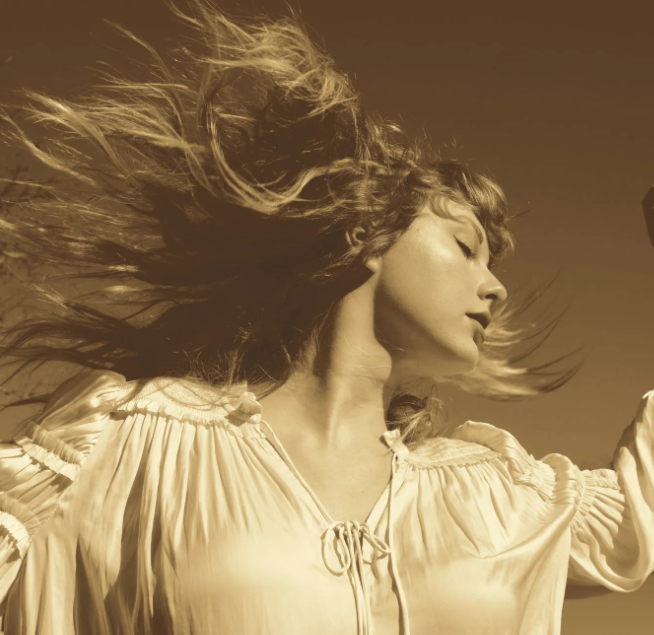“Fearless (Taylor’s Version)” from a new fan’s perspective
New and old fans of Taylor Swift have things to love in this re-release album.
April 16, 2021
Historically, I haven’t been a Taylor Swift fan. Though her music has been around for as long as I can remember, whether playing on car radios or in grocery stores, it was never something I actively chose to listen to. She may have dominated pop music for the last decade or more, but it always just seemed too evocative of an experience that I just didn’t relate to, namely those of teenage girls. In time, though, I found out that Swift’s music was quite diverse in its styles, tones and themes, with recent albums “folklore” and “evermore” grabbing my attention because of how different they sounded from what I thought a Taylor Swift record was. Due to their thematic depth and powerful storytelling, they compelled me more than any other album I heard in 2020 and sparked an interest in her previous work.
And lo, right on time does Swift deliver, announcing plans to re-record her first six albums. While most artists typically don’t put out re-releases of their work until much later on in their career, usually for financial gain, Swift has framed these new re-recordings in a different light. After her original back catalog was sold by her old music label, Big Machine Records, to manager Scooter Braun, a man Swift has had an adversarial history with, Swift has made her re-recordings a clarion call for artist ownership of music.
Swift establishes this battle as a moral one, where she is defending musicians everywhere and opposing backroom deals that deprive people of the fruits of their labor. By saying that “artists deserve to own their own work,” Swift is making what might otherwise be a boring, legal argument into one with more personal stakes, where she is reclaiming her life’s work. The first such re-recording came out on April 9, with a new version of “Fearless,” the album that arguably made her into the superstar that she is today.
Throughout her career, Swift has aimed to cultivate a seemingly personal relationship with her fans, maintaining online interactions with them and even visiting them in hospitals and giving them gifts. Well, it seems like that relationship is paying off in dividends, with the “Swifties” strongly supporting this new endeavour, decrying those who would work against her and embracing the new re-releases as an opportunity to delve into, and celebrate, their nostalgia for the 12-year-old album simultaneously.
But for me, someone who, before this year, had stayed away from Swift altogether, it was a brand new experience which proved to me that Swift’s reputation as a music monolith is well-deserved, right from the beginning. While I had been vaguely familiar with mega-hits like “You Belong With Me” and “Love Story,” the track “Fearless” was unfamiliar to me, so I decided to briefly listen to the original record before the new release. There, I was struck by the youthful earnestness of Swift as she reflects on the yearning and turmoil of her teenage years and was even more struck by the fact that, though she was only 18 at the time, she spoke so wisely about how things that seem important “when you’re fifteen” fade away.
In this new release, Swift, now at the age of 31, is able to inject even more reflectiveness and wisdom into her vocals, while staying remarkably true to the originals in terms of production––banjos and all. While some may ponder how one can sing emotionally about issues they dealt with decades ago, Swift is seemingly able to get into similar headspaces, while cooling down when appropriate. Adding a tad more maturity as she sings about an ex-lover who said they’d be together “forever and always,” Swift manages to elevate the work even more. By reflecting new facets of love, such as those of regret and forgiveness, simply through vocal tones alone, the new re-recording builds upon what the teenage Swift delivered. Also, to be honest, she’s just a much better singer now, even disregarding all the new depth introduced.
Along with all her old songs, the album also includes six new songs produced by her “folklore” collaborators Aaron Dessner and Jack Antonoff, that were written around the time of “Fearless” that never made the cut. While they don’t really sound like the rest of the album, these “from the vault” songs feature some standouts, such as “Mr. Perfectly Fine,” which has quite an energetic key change near the end, and “Bye Bye Baby,” which really should have made the cut all those years ago.
In the end, this new version of “Fearless” is a success, managing to make me a fan of a work I had dismissed long ago. In capturing the youthful spirit and building on it further, “Taylor’s Version” is the definitive one, even without considering the morality behind artist ownership of their music. Hopefully future re-recordings manage to remain as true, yet as inventive. This move was quite a risk for Swift, as she challenges the entire business model of music labels and advocates for the rights of musicians. I can only be glad she jumped in “head first, fearless.”




